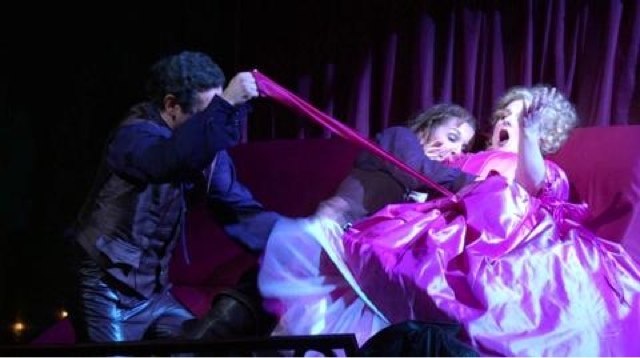Act I
France, around 1200. The Count of Formoutiers and most of the men have left for the Holy Land to fight in the Crusades, leaving behind the count’s sister, Adèle, and her companion Ragonde. The young Count Ory, who is trying to win the countess, is resolved to take advantage of the situation. With the help of his friend Raimbaud, he has disguised himself as a hermit and taken up residence outside the castle gates. Village girls and peasants gather to get the holy man’s advice on matters of the heart. Ory blesses them and promises to make all their wishes come true. Among the crowd is Ragonde. She tells Ory that, in the men’s absence, the ladies of the castle have taken a vow to live as widows, but that the Countess Adèle, who is suffering from a strange melancholy, will come to consult him. Ory is overjoyed at the prospect of seeing her.
Ory’s page Isolier arrives with Ory’s tutor, who is looking for his charge (“Veiller sans cesse”). The tutor is suspicious about the hermit’s identity and leaves to summon reinforcements. Isolier however, who does not recognize his master, confides to the “hermit” that he is in love with the countess and that he has a plan to enter the castle: he will disguise himself as a pilgrim (Duet: “Une dame de haut parage”). Ory, impressed by the idea, agrees to help but secretly resolves to use the plan for his own ends.
The countess appears, lamenting her melancholy (“En proie à la tristesse”). To her astonishment, Ory prescribes a love affair to cure her, which leads her to confess her feelings for Isolier. But the “hermit” warns her not to get involved with the page of the libertine Ory. Thankful for his advice, the countess invites Ory to the castle. They are about to leave when Ory’s tutor returns and unmasks him—to the collective horror of Isolier, the countess, and the other ladies. When news arrives that the Crusaders are expected back in two days, Ory resolves to stage another assault on the castle before their return.
Act II
At the castle that evening, the women angrily discuss Ory’s plot. A storm breaks and cries for help are heard from outside from a group of pilgrim women who claim that Ory is pursuing them. They are in fact the count and his men, disguised as nuns. The countess lets them in and one of them asks to express their gratitude. It is Ory, who, when left alone with the countess, is barely able to contain his feelings (Duet: “Ah! quel respect, Madame”). The countess orders a simple meal for the guests and leaves. Raimbaud, who has discovered the castle’s wine cellar, enters with enough to drink for everybody (“Dans ce lieu solitaire”). The men’s carousing gives way to pious chanting as soon as Ragonde comes within earshot.
Isolier informs the countess that the Crusaders will return that night. When Ragonde offers to tell their guests, Isolier realizes who they are and decides to play a joke on Ory. He extinguishes the lamp in the countess’s bedroom as Ory approaches to pay her an unexpected visit. Misled by the countess’s voice, Ory makes his advances towards Isolier (Trio: “À la faveur de cette nuit obscure”). When trumpets announce the return of the Crusaders, Isolier reveals his identity and Ory is left with no choice but to make his escape.






No comments:
Post a Comment